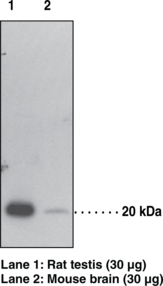Territorial Availability: Available through Bertin Technologies only in France
- Correlated keywords
- WB western blots blotting synthases antibodies antisera antiserum glutathione peroxidases selenium-dependent selenoprotein SnGPx phospholipases hydroperoxides monomeric homotetramer immunoblotting ferroptosis
- Product Overview:
Glutathione peroxidase 4 (GPX4) is a selenocysteine-containing glutathione peroxidase that is encoded by the GPX4 gene in humans and protects cellular membranes from oxidative damage.{48903,48904} It is a monomeric protein consisting of a thioredoxin motif and a selenocysteine-glutamine-tryptophan catalytic triad that reduces lipid hydroperoxides, including phospholipid, polyunsaturated lipid, and sterol hydroperoxides, to non-toxic lipid alcohols. During this process, the active site selenocysteine becomes oxidized and must subsequently be replenished by the reducing substrate glutathione (GSH).{48904} There are three isoforms of GPX4, mitochondrial mGPX4, cytosolic cGPX4, and nuclear nGPX4/snGPX4, that are expressed in all tissue types in rats, with the highest mRNA levels observed in testes.{48903,48904,48906} GPX4 is a key regulator of ferroptosis that inhibits ferroptotic cell death by preventing iron-dependent accumulation of toxic lipid reactive oxygen species.{48904} Mutations in GPX4 have been found in patients with Sedaghatian-type spondylometaphyseal dysplasia (SSMD), and silencing of Gpx4 in mice is embryonic lethal.{48905,48904} Cayman’s GPX4 Polyclonal Antibody can be used for immunohistochemistry (IHC) and Western blot (WB) applications. The antibody recognizes GPX4 at 20 kDa from human, mouse, rat, and porcine samples.
Cayman Chemical’s mission is to help make research possible by supplying scientists worldwide with the basic research tools necessary for advancing human and animal health. Our utmost commitment to healthcare researchers is to offer the highest quality products with an affordable pricing policy.
Our scientists are experts in the synthesis, purification, and characterization of biochemicals ranging from small drug-like heterocycles to complex biolipids, fatty acids, and many others. We are also highly skilled in all aspects of assay and antibody development, protein expression, crystallization, and structure determination.
Over the past thirty years, Cayman developed a deep knowledge base in lipid biochemistry, including research involving the arachidonic acid cascade, inositol phosphates, and cannabinoids. This knowledge enabled the production of reagents of exceptional quality for cancer, oxidative injury, epigenetics, neuroscience, inflammation, metabolism, and many additional lines of research.
Our organic and analytical chemists specialize in the rapid development of manufacturing processes and analytical methods to carry out clinical and commercial GMP-API production. Pre-clinical drug discovery efforts are currently underway in the areas of bone restoration and repair, muscular dystrophy, oncology, and inflammation. A separate group of Ph.D.-level scientists are dedicated to offering Hit-to-Lead Discovery and Profiling Services for epigenetic targets. Our knowledgeable chemists can be contracted to perform complete sample analysis for analytes measured by the majority of our assays. We also offer a wide range of analytical services using LC-MS/MS, HPLC, GC, and many other techniques.
Accreditations
ISO/IEC 17025:2005
ISO Guide 34:2009
Cayman is a leader in the field of emerging drugs of abuse, providing high-purity Schedule I-V Controlled Substances to federally-licensed laboratories and qualified academic research institutions for forensic analyses. We are certified by ACLASS Accreditation Services with dual accreditation to ISO/IEC 17025:2005 and ISO Guide 34:2009.





